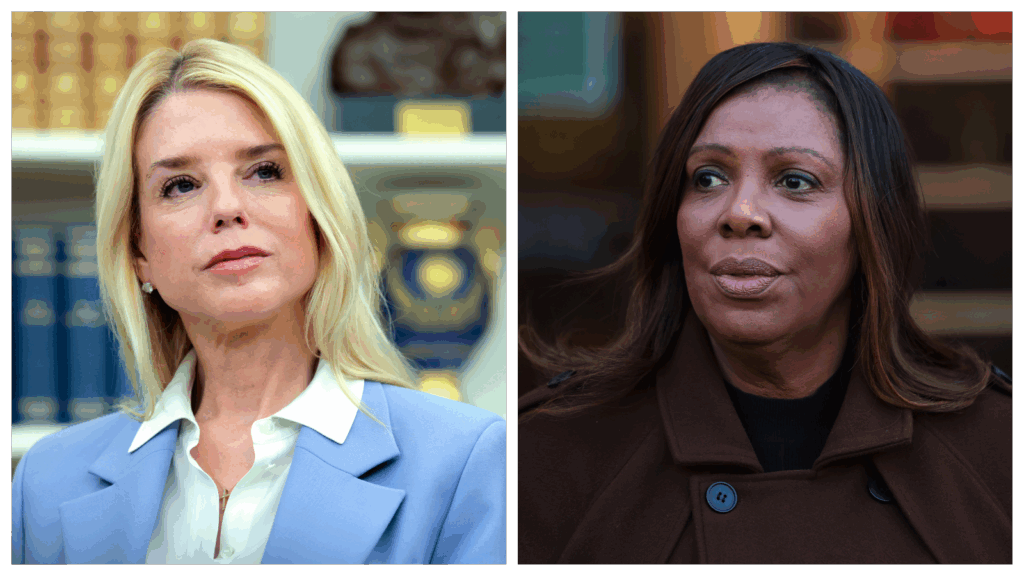The Department of Justice is firmly pushing back against New York Attorney General Letitia James’ accusations of political persecution, insisting that its actions follow established legal standards, emphasizing impartiality, and rejecting any suggestion that ongoing investigations are influenced by partisan motivations or external political pressure.
Federal prosecutors have sharply defended their case against New York Attorney General Letitia James, framing it as a standard mortgage fraud prosecution rather than a politically charged effort targeting one of President Donald Trump’s most prominent critics. According to the federal indictment, James faces two felony counts: bank fraud and making false statements to a financial institution. If convicted on both charges, she could face up to 60 years in prison and fines reaching $2 million. The core allegation is that James misrepresented a Norfolk, Virginia property as a second home rather than an investment to obtain more favorable mortgage terms. Prosecutors describe this conduct as typical of cases brought under federal mortgage fraud statutes, stressing that the indictment was supported by evidence presented to a grand jury. In their latest filing, they sought to portray the matter as routine and legally straightforward, despite the high political visibility of the defendant.
James’s legal team, however, has argued that the indictment is politically motivated retaliation engineered by Trump and his allies. They claim the prosecution was launched to punish her for her history of aggressively pursuing Trump in civil and criminal proceedings, including the high-profile mortgage fraud case that led to a massive financial judgment against him—originally $454 million before being dramatically reduced. Their argument emphasizes the timing of the indictment and President Trump’s repeated public calls for legal action against his opponents. The prosecution was brought by U.S. Attorney Lindsey Halligan, a Trump appointee who filed the charges shortly after Trump publicly urged criminal investigations into several political adversaries. Reports also suggest that some career prosecutors within Halligan’s office had concerns about the case, adding fuel to James’s assertion of political interference.
Despite these claims, federal prosecutors insist that James’s defense has provided no concrete evidence of malicious or politically motivated prosecution. They argue that political context—even Trump’s hostile commentary toward James—does not negate the legally sufficient indictment presented to the court. In their filing, prosecutors acknowledged that Trump’s public statements have oscillated between disdain and occasional praise for James, but they maintained that such comments had no bearing on the decision to indict. Instead, they stressed that the case was pursued solely at the discretion of Halligan, independent of presidential influence. The prosecutors cited longstanding judicial principles holding that courts cannot dismiss a valid indictment simply because of political disputes among public officials. They emphasized that the legal process must center on evidence, not external rhetoric or speculation.
The filing also addresses the controversy surrounding Ed Martin, the administration’s special attorney for mortgage matters, whose behavior sparked criticism even before the indictment was formally announced. Martin, in a highly unusual move, participated in a newspaper photo shoot outside James’s home and publicly called on her to resign. He also issued what prosecutors described as a “target letter” encouraging James to accept responsibility. James’s attorneys have used Martin’s actions to argue that the prosecution is tainted by improper political pressure and personal animosity. However, federal prosecutors attempted to distance the case from Martin entirely, emphasizing that he held no decision-making authority in the charging process. They insisted that Martin was neither the U.S. Attorney nor a signatory to the indictment and therefore his conduct, while unconventional, had no bearing on the legitimacy of the charges.
In rebuttal to the defense’s claims of political vindictiveness, prosecutors highlighted evidence they assert demonstrates James knowingly violated mortgage rules. Their filing includes an alleged 2024 text message in which James expressed concern that taking a particular tax deduction “looks suspicious” and stated that she needed “to do everything according to the tax code.” Prosecutors interpret this message as proof that James recognized the impropriety of her actions regarding the Virginia property. They argue that this evidence, combined with documentation from the mortgage application process, supports the contention that James intentionally misrepresented the nature of the property to secure financial benefits. According to prosecutors, this evidence aligns with the central elements of bank fraud and false-statement charges and stands independently of any political context.
The broader legal and political implications of the case are significant. James, who has pleaded not guilty, remains a polarizing figure due to her high-profile pursuit of Trump and ongoing litigation against his administration. Her prior campaign promise to “get Trump” has been invoked by both sides: her critics argue it reveals her own political motivations, while her allies maintain it underscores her commitment to accountability. Prosecutors argue that her political history cannot be used to shield her from unrelated criminal charges, while the defense insists that her prominence makes her a prime target for political retribution. The central question for the court will be whether the evidence presented represents an impartial application of federal law or whether the prosecution is, in effect, an extension of political warfare between Trump and one of his fiercest opponents. Regardless of the outcome, the case underscores the increasingly blurred line between law enforcement and politics in the current climate, raising questions about how justice can operate fairly when both sides claim political interference.





